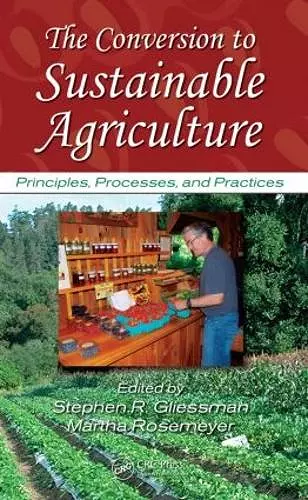The Conversion to Sustainable Agriculture
Principles, Processes, and Practices
Stephen R Gliessman editor Martha Rosemeyer editor
Format:Hardback
Publisher:Taylor & Francis Inc
Published:21st Dec '09
Currently unavailable, and unfortunately no date known when it will be back

With all of the environmental and social problems confronting our food systems today, it is apparent that none of the strategies we have relied on in the past―higher-yielding varieties, increased irrigation, inorganic fertilizers, pest damage reduction―can be counted on to come to the rescue. In fact, these solutions are now part of the problem. It is becoming quite clear that the only way to keep the food crisis from escalating is to promote the conversion processes that will move agriculture to sustainability.
Under the editorial guidance of agroecology experts Martha Rosemeyer and the internationally renowned Dr. Stephen R. Gliessman, The Conversion to Sustainable Agriculture: Principles, Processes, and Practices establishes a framework for how this conversion can be accomplished and presents case studies from around the world that illustrate how the process is already underway. The book provides a four-stage transition process for achieving sustainability and an in-depth analysis of the global efforts to make farms more energy-efficient and environmentally friendly.
An international team of chapter contributors explores ways to lessen dependency on fossil fuels and pesticides, and examines each step in the conversion process. They also describe the process of monitoring change toward sustainable agriculture while integrating social and economic analysis within scientific practices. Serving as both a core textbook for students and a comprehensive reference for agricultural practitioners, this volume is a valuable resource for the change that is needed in our food system now and in the future.
Framed by an awareness of the long-term destructiveness of established food system trends, it remains a hopeful book, with a focus on emerging alternatives. Twenty-five contributors present broad overviews and critical case studies of burgeoning sustainable agriculture movements on five continents, but North America gets the most attention, with excellent chapters on Cuba; Mexico; Ontario, Canada; and three regions of the US. The fascinating history of organic agriculture is presented as a case of a socio-environmental movement that risks diverging from sustainability as it grows and industrializes. Nonetheless, "organic" serves as a convenient proxy for "sustainable" through much of the book. This is a readable and information-packed volume, accessible to undergraduate students but rewarding to advanced students and sustainable agriculture professionals. Summing Up: Highly recommended. All collections.
–M. K. Bamford, Kentucky State University. CHOICE. JULY 2010, VOL 47, No 11
Refreshingly, the book acknowledges the difficulties of both researching and putting into practice changes at the whole system level as opposed to alterations in individual farming practices. Of particular value is the discussion of what motivates practitioners to alter their agricultural systems; this goes beyond the usual discussion of finance and markets to address issues such as family values and community development. ...This book will interest students and practitioners of organic agriculture but will also be of value to a much wider community concerned with reducing the dependence of agriculture on fossil fuels and the challenges of reconnecting agriculture and consumers.
--Christine A. Watson, The Journal of Experimental Agriculture, 2010.
ISBN: 9780849319174
Dimensions: unknown
Weight: 860g
380 pages